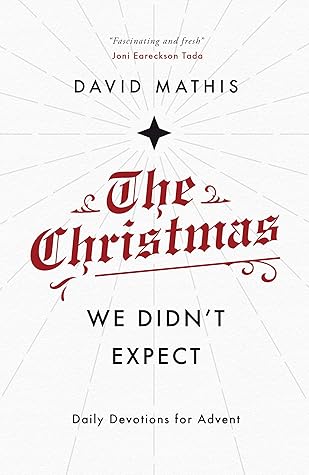More on this book
Kindle Notes & Highlights
by
David Mathis
Read between
November 22 - December 24, 2020
Christmas is supernatural. And our secular society is starving deep down for something beyond the natural, rarely admitting it, and not really knowing why. Christmas taps into something hidden in the human soul and woos us, even when it’s inconsistent with a mind that professes unbelief.
supernatural. At one end of Jesus’ earthly life lies his supernatural conception and birth; at the other, his supernatural resurrection and his ascension to God’s right hand. At both ends, the God-man’s authenticity is attested to by the supernatural working of his Father.
The light and joy of Christmas are hollow if we sever the link between Bethlehem and Golgotha. “The cross he bore for me, for you.” In this first advent, he came not in judgment but mercy. He did this for you. Christmas is for you only because his life was for you, and his death was for you, and his triumphant resurrection on the other side was for you. “Nails, spears shall pierce him through” doesn’t ruin Christmas. It gives the season its power.
God made our human souls in such a way that we will not be eternally content with that which is only human. Finitude cannot slake our thirst for the infinite. And yet, in our finite humanity, we also need a point of contact with the divine.
Godly submission doesn’t happen without effort—first from parents and then from their child. It is learned. Just as Jesus “learned obedience [to his heavenly Father] through what he suffered” (Hebrews 5:8), so he also learned it by Joseph’s patience and attention.
because our God loves to produce his best in the places we least expect, perhaps we shouldn’t be so surprised when he makes the forgotten places in our stories into his chosen channels of our greatest good. Father, we believe you are sovereign over, and present in, the most modest and uninteresting aspects of our lives.
God designed us for dynamic existence, for stages and seasons of life, for growth and development in body and in soul, both toward others and toward God.
No human, not even the God-man himself, skips the growth and maturation process, with all the attendant pains; and no true growth is one-dimensional but toward both God and man.
Because these Christians had God as their heavenly treasure, they were able to accept the loss of their earthly treasures in the calling of love. And not just accept, but joyfully accept. They joyfully accepted the loss of their finite, earthly, limited plural possessions because they knew they had the infinite, heavenly, all-satisfying, singular possession, whose name is Jesus.
Christmas isn’t just that Jesus came to save us, but that he is who he is. The great treasure isn’t what the magi brought but the one held in Mary’s arms. The surpassing value of Christmas isn’t finally knowing ourselves to be saved but knowing the Jesus who saves us.


